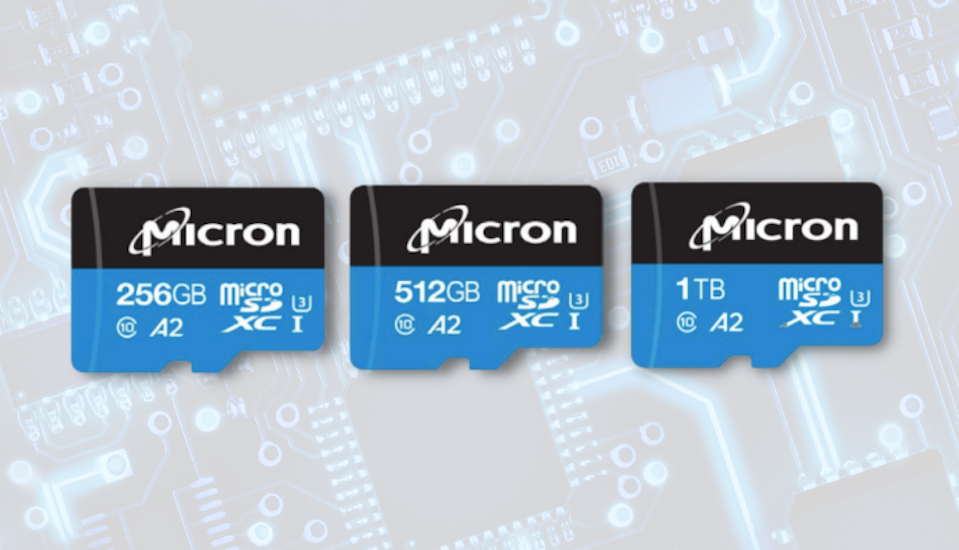
The News: Micron Technology announced expansions to its embedded product portfolio and ecosystem partnerships to deliver solutions designed for complex memory and storage demands at the intelligent edge. The company is sampling to customers its high-capacity microSD card, the i400, at a noteworthy density of 1.5 terabytes (TB). This card is designed for industrial-grade video security with the company’s 176-layer NAND.
To better provide its high-performance, ruggedized solutions to the industrial market, Micron is also adding partners to its Industrial Quotient (IQ) partner program. Additionally, the company is announcing it has received the first International Organization of Standardization (ISO) 26262 Automotive Safety Integrity Level (ASIL) D certification of memory for its low-power double data rate 5 (LPDDR5) DRAM, which is based on its 1α (1-alpha) process node. Read the Micron Press Release here.
Embedded World 2022: Micron Unfolds Compute Foundation Innovations for Accelerating Intelligent Industrial and Automotive Edge
Analyst Take: Micron’s three-prong Embedded World announcement, encompassing the i400 microSD card launch, the ISO 26262 ASIL D certification of memory for its low-power LPDDR5 DRAM, and expansion of its IQ partner program, delivers the industrial-grade memory and storage and ecosystem support capable of processing massive data sets at the intelligent edge, including harsh conditions, from high temperatures to shock and vibrations.
The swift expansion of AI and 5G-IoT, including especially AI-enabled 5G-IoT, is underpinning the requirement for higher capacity, greater bandwidth, and low-latency memory solutions in alignment with high capacity, fast-storage solutions at the intelligent edge. The proliferation of connected devices at the intelligent edge extends throughout key industry verticals such as smart manufacturing, autonomous vehicles, robotics, clean energy infrastructure, drones, industrial transport, and healthcare.
Micron i400 microSD Card: Taking Video Security to the Next Level
I see Micron’s 1.5TB i400 microSD card as playing an instrumental role in supporting edge storage for AI-enhanced video security across industry 4.0 environments such as smart manufacturing and critical infrastructure. Using Micron’s 28GB 176-layer 3D NAND die, 12 die are stacked into the microSD card. This design delivers breakthrough performance capabilities such as supporting concurrent 4K video recording and multiple AI streams.
AI workload support includes up to 8 AI capture events per second and higher random performance with minimal impact to overall card endurance. From my view, a key solution differentiator is the high endurance capabilities the solution provides consisting of up to five years of non-stop recording and improved background activity efficiency reducing overhead.
From my view, due to primarily to Micron’s 3D NAND innovations, the microSD i400 card can deliver the lower operating expenses, decrease bandwidth needs, and meet the demanding data retention requirements crucial to enabling hybrid & video surveillance as a service (VSaaS) deployments at the video security edge.
Micron LPDDR5 ISO 26262 ASIL D Certification Advances
On the industry-wide journey to fully autonomous vehicles, it is essential to ensure that automotive electric and electrical (E/E) systems meet rigorous safety standards. I believe Micron’s introduction of its low-power DDR5 DRAM, which is fully evaluated for automotive safety systems up to ASIL-D, meets this vital requirement. Fundamentally, I see fulfilling functional safety (FuSa) requirements as essential for advancing autonomous vehicle adoption and acceptance.
FuSa fundamentals include systematic fault coverage that encompasses product development which is designed using best-in-class processes, methodologies, and verification as specified by ISO26262. As such, the ASIL D specification is the most stringent (ASIL A is least stringent) covering topmost security features such as electric power steering and antilock braking.
From my perspective, electronic control unit (ECU) consolidation and increasing compute performance drive DRAM use in safety-critical ECUs such as domain controllers, gateways, AD/ADAS and central compute. Factor in LPDDR is the dominant DRAM technology for supporting automotive safety integrity and Micron’s competitive position becomes more attractive.
I anticipate that Micron’s ISO 26262 ASIL D certification of memory LPDDR5 DRAM can also play a decisive role in steering and accelerating the software-defined vehicle (SDV) ecosystem and OEMs in their transition from traditional domain controller-bound, point-to-point automobile networking architectures – that are increasingly rigid and expensive to implement – toward emerging zonal architectures that can take advantage of secure memory capabilities to unleash new safety, scalability, and intelligence benefits.
Additionally, I expect that Micron’s expansion of its IQ partner program can boost ecosystem-wide awareness and adoption of its new offerings since the program has a long, proven track record of cultivating highly calibrated collaboration with partners to produce solutions tightly aligned with industrial market’s demanding requirements such as longevity, ruggedness, reliability, quality, and app-specific features. I see the addition of Cognatec and Phytec, bringing the IQ program membership to ten, as validating its progress in powering collaboration-driven industrial value propositions.
Overall, I believe the new product portfolio and partner updates can bolster Micron’s ecosystem influence across the intelligent edge market segments, especially in the automotive and industrial segments, by showing it can consistently power memory and storage silicon innovation and collaboration.
Disclosure: Futurum Research is a research and advisory firm that engages or has engaged in research, analysis, and advisory services with many technology companies, including those mentioned in this article. The author does not hold any equity positions with any company mentioned in this article.
Analysis and opinions expressed herein are specific to the analyst individually and data and other information that might have been provided for validation, not those of Futurum Research as a whole.
Other insights from Futurum Research:
Micron Investor Day 2022: A Promising Look into the Growth of Memory and Storage
Micron Investor Day with Sumit Sadana – The Six Five Insiders
This article was originally published on Futurum Research.
Ron is an experienced research expert and analyst, with over 20 years of experience in the digital and IT transformation markets. He is a recognized authority at tracking the evolution of and identifying the key disruptive trends within the service enablement ecosystem, including software and services, infrastructure, 5G/IoT, AI/analytics, security, cloud computing, revenue management, and regulatory issues.


